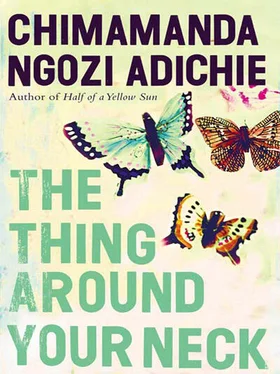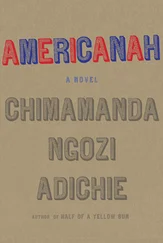Nwamgba was alarmed by how indiscriminately the missionaries flogged students — for being late, for being lazy, for being slow, for being idle. And once, as Anikwenwa told her, Father Lutz had put metal cuffs around a girl’s wrists to teach her a lesson about lying, all the time saying in Igbo — for Father Lutz spoke a broken brand of Igbo — that native parents pampered their children too much, that teaching the Gospel also meant teaching proper discipline. The first weekend Anikwenwa came home, Nwamgba saw angry welts on his back. She tightened her wrapper on her waist and went to the school. She told the teacher that she would gouge out the eyes of everyone at the mission if they ever did that to him again. She knew that Anikwenwa did not want to go to school, and she told him that it was only for a year or two, so that he would learn English, and although the mission people told her not to come so often, she insistently came every weekend to take him home. Anikwenwa always took off his clothes even before they left the mission compound. He disliked the shorts and shirt that made him sweat, the fabric that was itchy around his armpits. He disliked, too, being in the same class as old men and missing out on wrestling contests.
Perhaps it was because he began to notice the admiring glances his clothes brought in the clan but Anikwenwa’s attitude to school slowly changed. Nwamgba first noticed this when some of the other boys with whom he swept the village square complained that he no longer did his share because he was at school, and Anikwenwa said something in English, something sharp-sounding, which shut them up and filled Nwamgba with an indulgent pride. Her pride turned to a vague worry when she noticed that the curiosity in his eyes had diminished. There was a new ponderousness in him, as if he had suddenly found himself bearing the weight of a too-heavy world. He stared at things for too long. He stopped eating her food, because, he said, it was sacrificed to idols. He told her to tie her wrapper around her chest instead of her waist, because her nakedness was sinful. She looked at him, amused by his earnestness, but worried nonetheless, and asked why he had only just begun to notice her nakedness.
When it was time for his ima mmuo ceremony, he said he would not participate, because it was a heathen custom for boys to be initiated into the world of spirits, a custom that Father Shanahan had said would have to stop. Nwamgba roughly yanked his ear and told him that a foreign albino could not determine when their customs would change, so until the clan itself decided that the initiation would stop, he would participate or else he would tell her whether he was her son or the white man’s son. Anikwenwa reluctantly agreed, but as he was taken away with a group of boys, she noticed that he lacked their excitement. His sadness saddened her. She felt her son slipping away from her, and yet she was proud that he was learning so much, that he could become a court interpreter or a letter writer, and that with Father Lutz’s help he had brought home some papers that showed that their lands belonged to him and his mother. Her proudest moment was when he went to his father’s cousins Okafo and Okoye and asked for his father’s ivory tusk back. And they gave it to him.
Nwamgba knew that her son now inhabited a mental space that was foreign to her. He told her that he was going to Lagos to learn how to be a teacher, and even as she screamed — How can you leave me? Who will bury me when I die? — she knew he would go. She did not see him for many years, years during which his father’s cousin Okafo died. She often consulted the oracle to ask whether Anikwenwa was still alive; the dibia admonished her and sent her away, because of course he was alive. At last Anikwenwa returned, in the year that the clan banned all dogs after a dog killed a member of the Mmangala age grade, the age grade to which Anikwenwa would have belonged if he had not said that such things were devilish.
Nwamgba said nothing when he announced that he had been appointed catechist at the new mission. She was sharpening her aguba on the palm of her hand, about to shave patterns in the hair of a little girl, and she continued to do so— flick-flick-flick —while Anikwenwa talked about winning souls in their clan. The plate of breadfruit seeds she had offered him was untouched — he no longer ate anything at all of hers — and she looked at him, this man wearing trousers, and a rosary around his neck, and wondered whether she had meddled with his destiny. Was this what his chi had ordained for him, this life in which he was like a person diligently acting a bizarre pantomime?
The day that he told her about the woman he would marry, she was not surprised. He did not do it as it was done, did not consult people to ask about the bride’s family, but simply said that somebody at the mission had seen a suitable young woman from Ifite Ukpo and the suitable young woman would be taken to the Sisters of the Holy Rosary in Onicha to learn how to be a good Christian wife. Nwamgba was sick with malaria on that day, lying on her mud bed, rubbing her aching joints, and she asked Anikwenwa the young woman’s name. Anikwenwa said it was Agnes. Nwamgba asked for the young woman’s real name. Anikwenwa cleared his throat and said she had been called Mgbeke before she became a Christian, and Nwamgba asked whether Mgbeke would at least do the confession ceremony even if Anikwenwa would not follow the other marriage rites of their clan. He shook his head furiously and told her that the confession made by a woman before marriage, in which she, surrounded by female relatives, swore that no man had touched her since her husband had declared his interest, was sinful, because Christian wives should not have been touched at all .
The marriage ceremony in church was laughably strange, but Nwamgba bore it silently and told herself that she would die soon and join Obierika and be free of a world that increasingly made no sense. She was determined to dislike her son’s wife, but Mgbeke was difficult to dislike; she was small-waisted and gentle, eager to please the man to whom she was married, eager to please everyone, quick to cry, apologetic about things over which she had no control. And so, instead, Nwamgba pitied her. Mgbeke often visited Nwamgba in tears, saying that Anikwenwa had refused to eat dinner because he was upset with her or that Anikwenwa had banned her from going to a friend’s Anglican wedding because Anglicans did not preach the truth, and Nwamgba would silently carve designs on her pottery while Mgbeke cried, uncertain of how to handle a woman crying about things that did not deserve tears.
Mgbeke was called “missus” by everyone, even the non-Christians, all of whom respected the catechist’s wife, but on the day she went to the Oyi stream and refused to remove her clothes because she was a Christian, the women of the clan, outraged that she dared to disrespect the goddess, beat her and dumped her at the grove. The news spread quickly. Missus had been harassed. Anikwenwa threatened to lock up all the elders if his wife was treated that way again, but Father O’Donnell, on his next trek from his station in Onicha, visited the elders and apologized on Mgbeke’s behalf and asked whether perhaps Christian women could be allowed to fetch water fully clothed. The elders refused — if one wanted Oyi’s waters, then one had to follow Oyi’s rules — but they were courteous to Father O’Donnell, who listened to them and did not behave like their own son Anikwenwa.
Nwamgba was ashamed of her son, irritated with his wife, upset by their rarefied life in which they treated non-Christians as if they had smallpox, but she held out her hope for a grandchild; she prayed and sacrificed for Mgbeke to have a boy, because it would be Obierika come back and would bring a semblance of sense back into her world. She did not know of Mgbeke’s first or second miscarriage, it was only after the third that Mgbeke, sniffling and blowing her nose, told her. They had to consult the oracle, as this was a family misfortune, Nwamgba said, but Mgbeke’s eyes widened with fear. Michael would be very angry if he ever heard of this oracle suggestion. Nwamgba, who still found it difficult to remember that Michael was Anikwenwa, went to the oracle herself, and afterwards thought it ludicrous how even the gods had changed and no longer asked for palm wine but for gin. Had they converted, too?
Читать дальше











